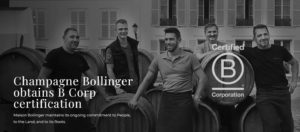Should you B Corp?
 If you’re in business, chances are you’ve already heard about B Corp certification. If so, you’ve probably wondered whether it’s the right thing for your company. You’ll most likely be asking yourself, ‘How will I benefit?’ and ‘Where do I even begin?’ Excellent questions! Let’s first address how your business could benefit and then we’ll tell you how to begin.
If you’re in business, chances are you’ve already heard about B Corp certification. If so, you’ve probably wondered whether it’s the right thing for your company. You’ll most likely be asking yourself, ‘How will I benefit?’ and ‘Where do I even begin?’ Excellent questions! Let’s first address how your business could benefit and then we’ll tell you how to begin.
Currently there are almost 130 Kiwi businesses that have B Corp Certification. This includes big businesses like Ethique, Kathmandu, Chia Sisters, Kiwibank, ecostore, Synlait Milk, and Pic’s Peanut Butter but also plenty of small businesses like Twiice, Like-Minded Learning, Sustained Fun, Tax Traders, Soul Studio Hot Yoga, Two Islands, and many more.
Globally, the movement is growing at an exponential rate. As more businesses take the B Corp plunge, even more are weighing up the benefits of becoming B Corp certified. That’s why we’ve put together this short ‘why and how’ of B Corp because when it’s done right, sustainability and B Corp is a massive opportunity. Let’s start with six reasons why…
-
Brand Loyalty
More shoppers are choosing ethical products and services. Many are prepared to pay more for sustainable brands. Millennials (80%) are almost twice as likely than Baby Boomers (48%) to pay more for sustainable products [Nielsen]. In the US, sales of products marketed as sustainable grew 5.6 times faster than other products from 2013 to 2018 [NYU Stern Center]
-
Recruitment and retention
The best talent are choosing to work for companies that align with their values. As well, existing staff are engaged and retained for longer. 75% of millennials would take a smaller salary to work for a sustainable company [G&A Institute survey] while according to LinkedIn, demand for ‘green’ jobs has tripled.
-
Cost savings
Businesses are finding significant cost savings from sustainable efficiencies and innovation. In one year, IBM saved $1.35 million from energy conservation initiatives. Interface Flooring saved $450 million by reducing/recycling its manufacturing waste from 1996 to 2013.
-
Legislation-proofing
ESG regulation is coming thick and fast. Governments are mandating companies to align with a net-zero agenda through policy and legislation. As well, the growth of climate change-related litigation is becoming a risk which businesses of all types cannot afford to ignore.
-
Access to capital
Increasingly, financiers, bankers, insurers and investors won’t work with companies that don’t have a sustainability strategy. CEO of BlackRock, the world’s largest asset manager, Larry Fink said: “There is no company whose business model won’t be profoundly affected by the transition to a net-zero economy.” Companies seeking investment with BlackRock must provide a plan for how their business model will be compatible with a net zero economy.
-
It boosts your bottom-line
That’s right, you make more money. Overall, B Corps are outperforming their non-B Corp peers. This has been empirically studied by a European university that found that based on data from 2012 to 2018, European B Corps had higher turnover as a result of B Corp certification. As well, a US academic study found that businesses that got on the sustainability train enjoyed a nine per cent increase in sales.
That’s just a few of the B Corp benefits. For some NZ industries, including wine and honey, B Corp is quickly becoming the norm so before long businesses that aren’t B Corp in some industries will be standing out for the wrong reasons.
If you’re ready to strap on your B Corp boots, you can do it all yourself by logging onto www.BImpactAssessment.net, registering for a free account and then answering the 200 or so questions that are relevant for your business. Some businesses though, get stuck doing it by themselves. So you also have the option of hiring a B Corp consultant, like us here at Grow Good. We live, breathe, and sleep B Corp. We exist to help businesses get B Corp certified as quickly as possible and with the highest score possible. If you need a hand, give us a call – details below. Or if you just want some more information for now, click here.
Become a B Corp
Are you more convinced that B Corp is right for you? Would you like to join the B Corp companies using business as a force for good? Here at Grow Good, we exist to coach people through the process of becoming B Corp certified.
The B Corp Impact Assessment framework is free to access and provides dozens of useful insights and opportunities for any business but it can be confusing and overwhelming.
We are consultants who have completed the official training provided by B Lab, the organisation that runs the B Corp certification programme. We live, breathe and sleep B Corp. We are your friendly B Corp buddies. We make it easier. We translate the questions into plain English and give you a host of template policies and example documents so you don’t have to start everything from scratch or reinvent the wheel. We show you how to unlock the big point scoring areas most relevant to your business.
Are you ready to go B Corp? It’s completely your decision but if you are, and if you think it would be helpful to have a guiding hand through the process, we’re here to help. Drop us a line or jump straight in and book a free call here.
Yours in purpose,
Kia kaha,
Tamara

 So what’s B Corp? It’s essentially a third-party, independent verification of a company’s social and environmental performance. It’s also a global movement that’s working to transform the world’s economy by building a community of businesses that are committed to being a force for good.
So what’s B Corp? It’s essentially a third-party, independent verification of a company’s social and environmental performance. It’s also a global movement that’s working to transform the world’s economy by building a community of businesses that are committed to being a force for good.